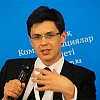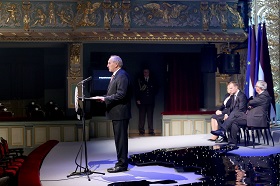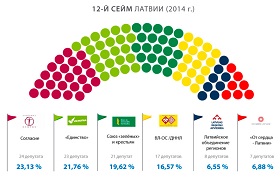Amidst the current geopolitical crisis, Latvia, which calls for the international isolation of Russia, took over the rotating Presidency of the EU Council on January 1, 2015. The Eastern Partnership program that provoked the Ukrainian crisis and a general deterioration of relations between Russia and Western countries ranks high on the agenda of this Presidency. Will the Latvian EU Council Presidency lead to a new downward spiral of international tensions?
Corridor of opportunities
At the time of the official launch of Latvia’s Presidency of the EU Council, Russia's relations with the European Union and the United States were facing the most acute crisis in the past decade. By the beginning of 2015, the controversy over the Ukrainian issue between Western countries and Moscow had resulted in the imposition of sanctions against more than 50 Russian companies, including the largest banks (VTB, Russia, Sberbank, Vnesheconombank, etc.) and energy companies (Transneft, Gazprom Neft, Rosneft and others). The import of goods from the Crimea was banned, and 63 Russian citizens were put on a “blacklist.” The Russian side retaliated by drawing up its own list of EU and US officials to be denied entry to the country, as well as imposed an embargo on agricultural raw materials and products from these countries.
After almost a year, it has become obvious that this “exchange of pleasantries” has helped little to resolve the Ukrainian crisis, but proponents of sanctions are in no hurry to change their tactics to solve this problem. Angela Merkel in a January interview with the German edition of Frankfurter Allgemeine Zeitung said that the EU was likely to give further effect to the anti-Russian sanctions in spring [1]. Accordingly, Russia, which regards these sanctions as illegal, is not going to even discuss the conditions of their lifting, as Russian Foreign Minister Sergei Lavrov professed after a meeting with his Latvian counterpart Edgars Rinkēvičs in January [2].
Even though both sides continue to make such forceful statements, ways to resolve the impasse appear to be taking shape. Negotiations on an economic integration agreement between the European Union and the Eurasian Economic Union appear to be the most effective tool for normalizing the international situation in Europe. Evgeny Vinokurov, Doctor of Economics and Director of the Center for Integration Studies at the Eurasian Development Bank, calls this agreement a “megadeal,” [3] as it is able to determine the vector of the European development for decades to come. The interest displayed in this “megadeal” by both Russia and the European Union make it particularly significant in the current environment. So, in discussing Russia's relations with European countries in November 2011 at the meeting of the Council on Foreign and Defense Policy, Sergey Lavrov promised to promote the “integration of integrations” as the “key topic” within the OSCE [4]. The same month, German Foreign Minister Frank-Walter Steinmeier in an interview with Welt am Sonntag newspaper called for negotiations between the EU and the Eurasian Union [5].
This format of dialogue, based on economic pragmatism, may be the rescue remedy for the deteriorating political relationship between Russia and the EU. Under these circumstances, Latvia, which holds the European Union Presidency in the first half of 2015, has a chance to play an important role in promoting this “megadeal” and, accordingly, the resolution of the crisis of international relations in Europe.
Can Latvia become a mediator between the EU and Russia?
The political spectrum of Latvia includes, among others, supporters of the integration of the European and Eurasian Unions in the common economic space from Lisbon to Vladivostok. The most popular party in the country, Harmony, is one of them. Thus, leader of the largest faction of the Latvian Saeima “Harmony Center” Janis Urbanowicz proposed in his article “How to defuse the time bomb?” an intensification of consultations on harmonizing regulatory practices in the trade and economic sphere, as well as on the EEU’s adoption of international industry standards. Furthermore, stating the unproductive nature of the sanctions regime, the politician recommends accompanying its cancellation with negotiations on visa-free arrangements [6]. In addition, the party supports the annual holding of the expert Baltic Forum in Latvia, and in May 2014, its group of analysts presented a package of proposals [7] to prevent a geopolitical crisis in Europe, which emphasized achieving balanced cooperation between the countries of the Eastern Partnership and both the EU and EEU.
The parliamentary elections held in the country in the autumn of 2014 gave these ideas a chance to find their way into the program of Latvia's EU Council Presidency. Repeating the success of 2011 parliamentary elections, Harmony gained a victory and formed the largest faction in the Saeima [8]. However, despite the consistently high electoral support for this political force, the right to form a coalition government was given to the runner-up Unity party (in 2011, the latter formed the government as only the third most popular party in Latvia). Eventually, right-wing conservative political forces formed a coalition, while the Harmony party received no ministerial portfolios at all and was forced into opposition.
Thus, politicians, who see the relationship between Russia and the EU through the prism of the Cold War’s “buffer logic,” have taken the lead in Latvian diplomacy during the Presidency of the Republic in the European Union. The activities of Foreign Minister Edgars Rinkēvičs in just the one year of 2014, preceding the Latvian EU Presidency, offer plain evidence of this. For example, in the spring of 2014, the Minister lobbied the idea of transforming the Eastern Partnership into the Euro-Atlantic Eastern Partnership through the involvement of the United States in the European initiative. Russia at the same time would remain outside the program, which is nothing short of a provocation.
The EU’s “geopolitical overtures” to Ukraine in preparation for the Eastern Partnership Vilnius Summit without consultations with Russia became the prologue to the current international relations crisis in Europe. Enhancing the US role in the region would instead convince Moscow that the Eastern Partnership is more a tool for building a political and economic buffer along the western borders of the country, rather than stabilize the situation. The apparent conflict potential of Edgars Rinkēvičs’s idea prevented Brussels from rendering support to the Euro-Atlantic Eastern Partnership initiative. As a result, the Riga Eastern Partnership Summit is likely to become an event for the sake of appearances only, whose most important decision will be the creation of a pan-European Russian-language channel [9].
Latvia’s ban on Russian pop stars from entering the country became another striking example of its provocative foreign policy. In the summer of 2014, Oleg Gazmanov, Joseph Kobzon and Valeriya were barred for political reasons from entering the country right before the opening of the annual New Wave contest of young singers held in the resort city of Jurmala [10]. Russia's Permanent Representative to the European Union Vladimir Chizhov was more than accurate, when he called such actions of Latvia “a manifestation of provincialism in politics.” [11] As a result, due to the deficiency in Latvian democracy, the EU happens to have a country at its head whose leadership is incapable of conducting a conflict-free policy towards Russia.
What are the European risks under the Latvian presidency?
The diplomatic outfit of the current leadership of the EU’s Presiding country suggests that the next half year is fraught with additional risks for relations between Russia and the European Union. As a conductor of Washington's interests in Europe, Latvia is not interested in promoting a stabilized dialogue between Moscow and Brussels during its Presidency. Moreover, the reverse is true: according to the official program, the rapprochement between the EU and the US has been made one of the priorities of Latvia’s Presidency. Since the Lithuanian Presidency in 2013, this task has been implemented by EU’s persistent destruction of its eastern bonds. The Ukrainian crisis that erupted exactly in the second half of 2013 became an effective tool used to this end. Now Riga, apparently, will spare no effort to continue putting up a wall between the EU and Russia, which was started by Vilnius.
The first month of the Latvian Presidency already testifies to this. In mid-January, Edgars Rinkēvičs said that he would promote the recognition of Donetsk and Lugansk People's Republics as terrorist organizations by the European Union, as the Presidency status offers added opportunities to this end [12].
The successful implementation of this task will have serious consequences for Russia which protects the interests of the DNR and the LNR in the Ukrainian crisis settlement. The recognition of the self-proclaimed Donbass republics as terrorist organizations will actually outlaw the Russian leadership too, making it impossible to develop relations between Moscow and EU even within the EEU framework. Accordingly, the inability to create a single economic space from Lisbon to Vladivostok will prompt the European Union to establish a free trade zone with the United States.
There is little doubt that the efforts to normalize the dialogue between Russia and the EU would benefit not only the major European actors, but Latvia too. The current confrontational policy is a severe strain on the budget of the Republic. Due to the departure of the New Wave [13], the country lost the 17 million euros that the festival earned annually. In January, it was announced that KiViN music festival, Jurmalina humor festival and Comedy Club stand-up comedy TV show broadcast would leave the country as well [14]. In December, the Latvian Association of Travel Agents reported that the flow of tourists from Russia in the country had decreased by 70 per cent [15]. According to Latvian economist Olga Pavuk, the complex losses suffered due to the Russian embargo amount to about 2.3 billion euros or 10 per cent of GDP [16]. In October 2014, the Transneft proposal to redirect export flows of oil from Latvia to the ports of Primorsk and Ust-Luga gained the support of Russian energy companies [17].
Latvia’s mediating role between the EU and Russia during the Presidency could guard the country against these losses and seriously strengthen its prestige in the international arena. Instead, over the next six months, Latvia will most likely be involved in an irrational struggle against the “Kremlin hands” in the EU and in lobbying US interests in Europe. If the archaic and narrow-minded views of the current Latvian diplomacy on the international relations fail to create additional problems for finding a compromise solution for the crisis in relations between Brussels and Moscow, it will be the best outcome of this Presidency for the European Union and Russia.
1. “Eine Islamisierung Deutschlands sehe ich nicht” - http://www.faz.net/aktuell/politik/inland/angela-merkel-ueber-konsequenzen-der-pariser-anschlaege-13372282-p5.html.
2. We shall not discuss anything – Lavrov on lifting sanctions against Russia – http://ria.ru/tv_politics/20150112/1042252723.html.
3. E.Vinokurov. Megasdelka na fone krizisa // Rossija v global'noj politike. V.12, # 5, 2014. Url: http://www.globalaffairs.ru/number/Megasdelka-na-fone-krizisa-17113
4. Remarks by Foreign Minister Sergey Lavrov at the XXII Assembly of the Council on Foreign and Defense Policy, Moscow, November 22, 2014 http://www.mid.ru/brp_4.nsf/0/DC5FF1F87726417FC3257D9800518D9A
5. It doesn’t have the same strategy of political pressure with a simultaneous willingness to negotiate. But if you remember how nervously Russia responded to a free trade agreement between the EU and Ukraine, as well as the EU nervous reaction to the project of the Eurasian Union, the beginning of contacts between the EU and the Eurasian Union can help to correct the situation. The meeting of the two organizations on an equal basis can contribute to the mitigation of relations http://www.welt.de/politik/deutschland/article134378688/Europaeische-Friedensordnung-steht-auf-dem-Spiel.html
6. Janis Urbanowicz. Kak obezvredit' bombu zamedlennogo dejstvija? - http://www.rubaltic.ru/article/politika-i-obshchestvo/03062014-Urbanovich/?sphrase_id=11086
7. Tupik bor'by integracij v Evrope- http://www.insor-russia.ru/files/INSOR20140620.pdf
8. See the election results for the 12th Saeima of Latvia on the Central Elections Commission website - http://sv2014.cvk.lv/index_rez.html
9. Poroshenko supported the idea of creating a Russian-language channel in the EU http://news.liga.net/news/politics/4703588-poroshenko_podderzhal_ideyu_sozdaniya_russkoyazychnogo_kanala_es.htm
10. The official message of the ban on the entry of a number of Russian citizens on the Latvian Foreign Ministry site http://www.mfa.gov.lv/aktualitates/zinas/36545-arlietu-ministrs-edgars-rinkevics-pienem-lemumu-par-krievijas-pilsonu-ieklausanu-iecelosanas-aizlieguma-latvija-saraksta.
11. Vladimir Chizhov: Politicheskij provincializm Pribaltiki razdrazhaet mnogih v ES - http://www.rubaltic.ru/article/politika-i-obshchestvo/17122014-chizhov/?sphrase_id=11088.
12. It is necessary to have legal facts that we should get from the law-enforcement agencies of Ukraine... I talked about it at the European Council on Foreign Relations too. The Council's mandate came into force in July 2014, but then the work on this issue stopped. If it is now resumed, the leadership in this process is the responsibility of the Presidency. I really want to see all of these factors, and we'll play it by ear. http://rus.delfi.lv/news/daily/latvia/rinkevich-dnr-i-lnr-nado-priznat-terroristicheskimi-organizaciyami.d?id=45453176
13. Klement'ev: Jurmala poterjaet 17 mln evro s uhodom «novoj volny» - http://www.mixnews.lv/ru/economics/news/2015-01-12/167949
14. Comedy Club uhodit iz Jurmaly vsled za «Jurmalinoj» i «Golosjashhim Kivinom» - http://www.delfi.lv/showtime/news/whatson/festivals/comedy-club-uhodit-iz-yurmaly-vsled-za-yurmalinoj-i-golosyaschim-kivinom.d?id=45540830
15. Associacija turagentstv Latvii: chislo turistov iz RF sokratilos' na 70% - http://ria.ru/tourism/20141218/1039008721.html
16. «Torgovye vojny» ES i Rossii: posledstvija dlja stran Baltii - http://www.dw.de/торговые-войны-ес-и-россии-последствия-для-стран-балтии/a-17869041
17. Rossijskaja neft' uhodit iz Latvii - http://expert.ru/2014/10/16/ujti-iz-latvijskih-portov/






